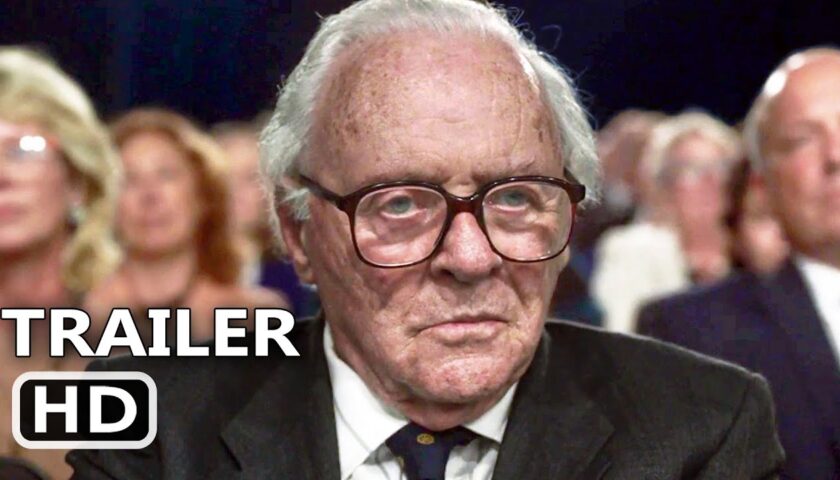285 total views, 1 views today
One Life 2023 Movie Review
A classically crafted feature debut from veteran TV director James Hawes (“Black Mirror”), “One Life” intercuts two eras 50 years apart in the long life of humble British humanitarian Sir Nicholas Winton (1909-2015), referred to by some as “the British Schindler.” The biopic serves as a testament to the power of good, with a prestige cast including a fine, understated Anthony Hopkins as the reflective, older Winton, still haunted by the tragic end to his plan to save European child refugees, and Johnny Flynn as his energetic younger self, who embodies the belief that that if something is not impossible, then there must be a way to do it. Although the film as a whole struggles to match the poignancy of its finale, a re-creation of a famous 1988 clip from the British TV program “That’s Life!,” it nevertheless serves as an urgent reminder of the importance of individual action at a time when the world refugee crisis is at a scale not seen since the Second World War.
In December 1938, Winton, known as Nicky, then a 29-year-old London stockbroker, visits Prague. Seeing the appalling conditions in refugee camps housing those fleeing from Austria, Germany and the Sudetenland, he launches an operation to rescue vulnerable children under the auspices of the British Committee for Refugees in Czechoslovakia. Many of the youngsters are Jews in imminent danger of deportation. Before WW2 is declared on Sept. 1, 1939, he masterminds eight successful transports, bringing 669 Czech and Slovak youngsters to foster families in Great Britain.
As the ever-modest Winton would have wanted, the film is careful to share the credit for the evacuation transports and host family placements. While he ultimately organizes and raises money from the UK, we see (albeit barely characterized) Doreen Warriner (Romola Garai), head of the British Committee for Refugees from Czechoslovakia in Prague, and Trevor Chadwick (Alex Sharp), a former school teacher, doing dangerous work on the ground in the Czech capital.
A more prominent figure in the film, finally receiving credit, is Nicky’s mother, the tireless Babette Winton (tartly portrayed by Helena Bonham Carter), a German-Jewish migrant herself, since converted to the Church of England. She gets some of the best lines, including crucial expository ones, such as when she shames a minor English bureaucrat by extolling what she sees as the British virtues of a commitment to decency, kindness and a respect for others.
While the tense, action-oriented 1938-39 timeline is inherently more compelling because of the race to get all the moving pieces (the trains, the visas, the host families, the £50-per-child bond, medical certificates) in place to transport the children out of Prague before the Nazis enter and the borders close, the 1988 section is slower and more contemplative. Nearing 80-years-old and urged by his wife Grete (Lena Olin) to reduce some of his store of papers, Winton, who never told his family about his role in saving so many refugees, wonders what lessons the scrapbook documenting his work might offer to a wider public.
Strangely for a script based on the book “If It’s Not Impossible” by Winton’s daughter Barbara, the portrayal of Nicky’s Danish-born wife strikes an off-key note. Rather than a much-loved support, she comes across as a critical, neatnik nag. Plus, the miscast Lena Olin, almost unrecognizable under a bad wig, looks so much younger than Hopkins that one might first assume that she’s his daughter.
Why did Winton never discuss his heroic acts prior to 1988? The film sidesteps the question, but shows that its protagonist considers himself an ordinary man whose lifelong values dictate his actions. As we see when he meets his old friend Martin (Jonathan Pryce), the man who urged him to go to Prague in the first place, they are from a generation that rarely speaks about the past, much less the traumas they have seen or endured.
This, in part, is what makes Winton’s two appearances on “That’s Life!” so emotionally stirring. The past deeds that he has so long ignored reap a harvest of feelings guaranteed to draw a tear from even the hardest of hearts.
Shooting on location in both the U.K. and Czech Republic, helmer Hawes and his collaborators create strong period looks for each timeline, giving them each their own natural rhythm. Ace editor Lucia Zucchetti moves seamlessly back and forth between them while Volker Bertelmann’s attractive piano and orchestra score is never overbearing.
